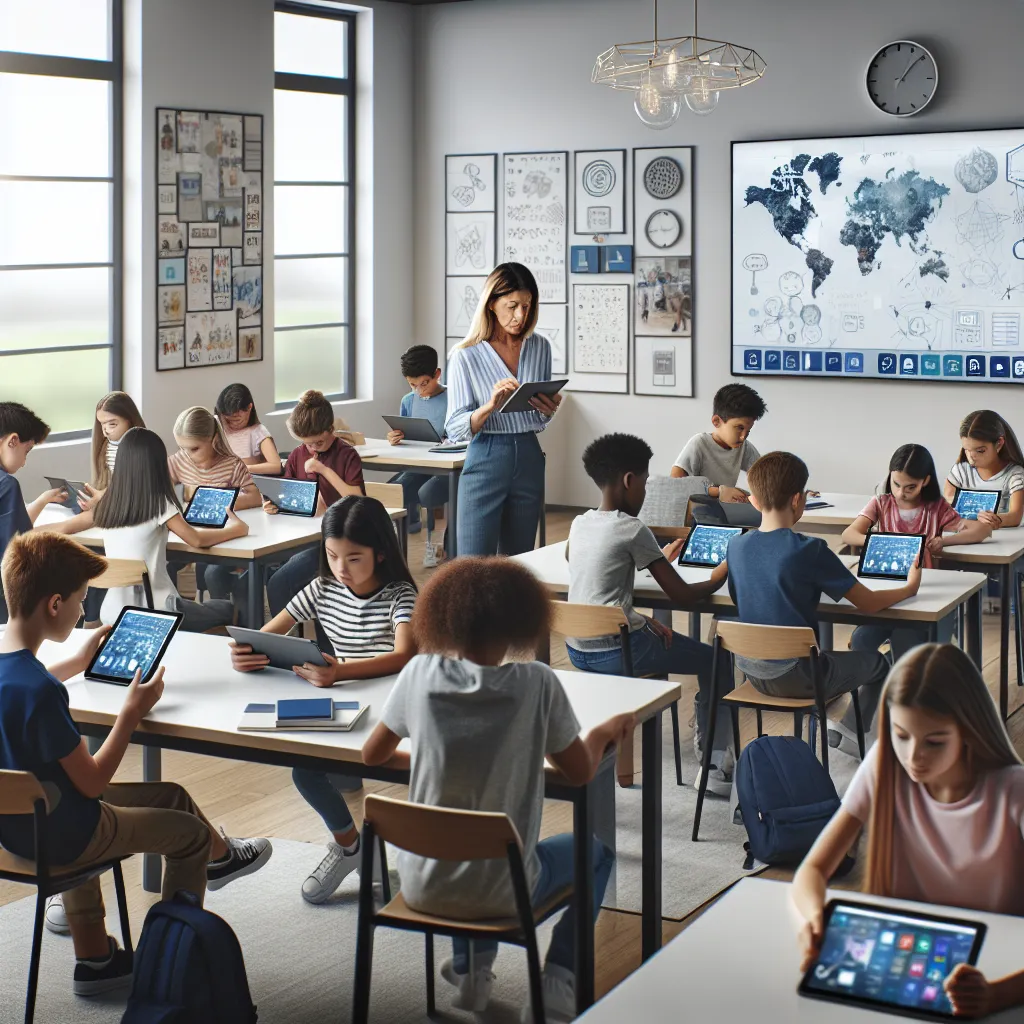As an IELTS Writing Task 2 expert, I’ve observed that topics related to digital tools in education have become increasingly prevalent in recent years. This trend is likely to continue, given the rapid technological advancements in the field of education. Let’s explore this topic in depth, focusing on a sample question that closely resembles those seen in actual IELTS exams.
 Digital tools enhancing classroom learning
Digital tools enhancing classroom learning
Analyzing the Question
Let’s examine a question that reflects the current IELTS trends:
Some people think that digital tools and internet-based resources should replace traditional teaching methods. Others believe that these tools should only supplement conventional teaching practices. Discuss both views and give your own opinion.
This question addresses the ongoing debate about the role of digital tools in education. It requires you to:
- Discuss the view that digital tools should replace traditional teaching methods
- Explore the perspective that digital tools should only supplement conventional practices
- Provide your own opinion on the matter
Sample Essay
Here’s a model essay that addresses the question effectively:
In recent years, the integration of digital tools and internet-based resources in education has sparked a debate about their role in the classroom. While some argue that these technologies should entirely replace traditional teaching methods, others believe they should merely supplement existing practices. This essay will explore both viewpoints before offering a personal perspective on the matter.
Those who advocate for the complete replacement of traditional teaching methods with digital tools argue that technology offers numerous advantages. Firstly, digital resources can provide more engaging and interactive learning experiences, capturing students’ attention and improving information retention. Additionally, online platforms allow for personalized learning paths, adapting to individual students’ needs and pace. Moreover, digital tools can offer instant feedback and assessment, enabling students to track their progress more effectively.
On the other hand, proponents of using digital tools as supplements to conventional teaching practices highlight the importance of maintaining human interaction in education. They argue that teachers play a crucial role in providing emotional support, motivation, and nuanced explanations that technology alone cannot replicate. Furthermore, traditional methods such as face-to-face discussions and hands-on activities foster critical thinking and social skills that are essential for students’ overall development. These advocates believe that a balanced approach, combining digital and traditional methods, can leverage the strengths of both.
In my opinion, the most effective approach lies in thoughtfully integrating digital tools to enhance, rather than replace, traditional teaching methods. While technology offers valuable resources and innovative learning opportunities, the guidance and expertise of human teachers remain irreplaceable. A blended learning model, where digital tools complement face-to-face instruction, can create a rich and diverse educational experience. This approach allows students to benefit from the advantages of technology while still developing crucial interpersonal and critical thinking skills through traditional teaching methods.
In conclusion, while digital tools and internet-based resources have transformed education, they should be viewed as powerful supplements to, rather than replacements for, conventional teaching practices. By striking a balance between technological innovation and traditional pedagogy, educators can create a comprehensive learning environment that prepares students for the challenges of the modern world.
(Word count: 329)
Writing Tips
When addressing this topic, consider the following:
- Use specific examples: Mention particular digital tools or traditional teaching methods to support your arguments.
- Balance your discussion: Ensure you give equal attention to both viewpoints before presenting your opinion.
- Use appropriate transitions: Employ phrases like “On the other hand,” “Moreover,” and “In conclusion” to improve coherence.
- Vary your sentence structures: Mix simple, compound, and complex sentences to enhance your writing style.
- Use academic vocabulary: Incorporate formal language and topic-specific terms to demonstrate your lexical resource.
Key Vocabulary
Here are some essential words and phrases to remember for this topic:
- Integration (noun) /ˌɪntɪˈɡreɪʃn/: The act of combining or adding parts to make a unified whole.
- Supplement (verb) /ˈsʌplɪment/: To add an extra element or amount to something.
- Personalized learning (noun phrase) /ˈpɜːrsənəlaɪzd ˈlɜːrnɪŋ/: Education tailored to individual students’ needs and abilities.
- Blended learning (noun phrase) /ˈblendɪd ˈlɜːrnɪŋ/: An approach that combines online educational materials with traditional classroom methods.
- Critical thinking (noun phrase) /ˈkrɪtɪkl ˈθɪŋkɪŋ/: The objective analysis and evaluation of an issue to form a judgment.
- Pedagogy (noun) /ˈpedəɡɒdʒi/: The method and practice of teaching.
- Interactive (adjective) /ˌɪntərˈæktɪv/: Allowing a two-way flow of information between a computer and a user.
- Nuanced (adjective) /ˈnjuːɑːnst/: Characterized by subtle shades of meaning or expression.
Conclusion
The topic of digital tools in education is likely to remain relevant in IELTS Writing Task 2. As you prepare, consider exploring related themes such as:
- The impact of artificial intelligence on education
- The digital divide and its effects on learning opportunities
- The role of social media in education
- Online learning vs. traditional classroom learning
- The importance of digital literacy in the modern job market
By familiarizing yourself with these topics and practicing your essay writing skills, you’ll be well-prepared to tackle any question related to digital tools in education that may appear in your IELTS exam.
For more insights on related topics, you might find these articles helpful:
- Digital Literacy and Career Success
- The Role of Technology in Improving Education Outcomes
- The Role of Education in Fostering Innovation
Remember, the key to success in IELTS Writing Task 2 is not just about knowing the topic, but also about presenting your ideas clearly, coherently, and accurately. Keep practicing, and you’ll be well on your way to achieving your desired band score!


